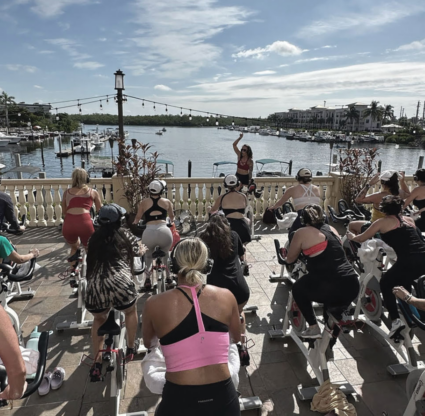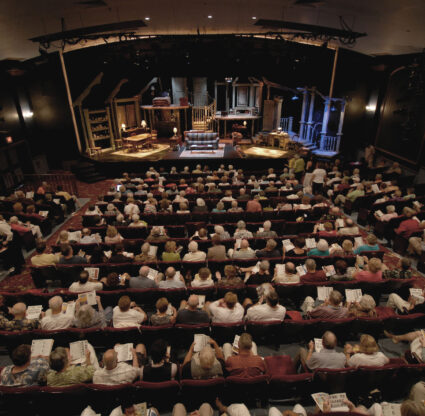Boogie with the baby
Being pregnant can be uncomfortable at times, to say the least. And dancing while pregnant may not sound relaxing either. But Dancing for Birth, now being held at Cape Coral Hospital, can be a way to ease that discomfort. The program, developed by a St. Louis doula, is a mix of world dances—African, Latin, Indian—stretching and yoga. The idea is to use movement to lessen the pains of pregnancy. Women also learn practical positions to facilitate labor. “It cuts down so much on the discomfort, and it just makes the women feel better,” says Nancy Travis, director of Women’s Services—Birth Suites, Cape Coral Hospital. For more information, call 424-2211 or visit dancingforbirth.com.
 Support for caregivers
Support for caregivers
Most stroke victims have a tough road to recovery. So do their spouses. A new study from the American Heart Association showed that caregivers of people who have suffered strokes were at an increased risk for illness. The study followed hundreds of caregivers (mostly spouses) for seven years, finding that, once all other variables were controlled, they were in general worse off physically and mentally compared to spouses of non-stroke victims. Researchers suspect the chronic stress of caregiving may contribute to the results. They recommend caregivers attend support groups or get regularly screened for depression or other issues related to stress. “It’s important that society … is knowledgeable about caregivers’ situations and risk of decreased well-being even after an apparently mild stroke,” study author Dr. Josefine Persson told Reuters.
Hit the gym for longer life
The fountain of youth can be found in the gym. A 40-year study of men in Oslo found that those who regularly exercised lived about five years longer than those who didn’t exercise.
Fitness Tip of the Month
Think you’re fast on land? Try running in water. Seriously: Aqua jogging may be great for you, says Ruth Fraley, a trainer who specializes in water exercise at NCH. Get in water about chest-high. Then, lean forward a bit. Bend your elbows 90 degrees. And, you’re off—use a similar motion as if you’re actually running, hitting heel-toe with your feet (the natural tendency is to hit toe-heel when you’re in water). Keeping your elbows cocked, move your arms in a way that you could slide a hand in your back pocket. It might seem awkward at first, but the water resistance means you’re exercising more muscles. Plus, it can help with your speed and endurance on land, Fraley says. She recommends trying it for a half-hour, three days a week.
Sleep soundly in old age
Need a good night’s sleep? Maybe just wait a few years. A Swiss study published by Taylor & Francis found that as people age they sleep less—but the quality of their sleep improves.
 When caffeine is more than just a buzz
When caffeine is more than just a buzz
Most people need at least a cup of coffee in the morning to get going. But making caffeine a constant presence throughout the day can be worrisome. So much so that the FDA has warned of the potential for caffeine overdose. The agency says the onslaught of caffeinated products—from Red Bull and Jolt gum to powdered caffeine that contains the equivalent of 28 cups of coffee in one teaspoon—has turned the once unheard of concept of an overdose into a serious problem. Death from an overdose is rare. But anywhere beyond 400 milligrams (or four cups of coffee) can cause insomnia, elevated heartbeat, muscle tremors and upset stomach, according to the Mayo Clinic.
Hangover cure
A new study by Canadian and Dutch researchers found the cure for a hangover. Coffee? Hair of the dog? Nope. There’s only one cure: Don’t drink that much. Yep, took a whole team of scientists to figure that one out.
Doctors zero in on Alzheimer’s risks
Good news for Alzheimer’s prevention. A new study published in the Journal of Neurology Neurosurgery & Psychiatry found nine risk factors that were linked to the disease. Many are within your control: obesity, carotid artery narrowing, low educational attainment, depression, high blood pressure, frailty, smoking, Type 2 diabetes and high levels of the amino acid homocysteine. The researchers in their analysis of hundreds of studies found that about two-thirds of Alzheimer’s cases had those factors in common. While no cure exists, researchers say prevention may be the greatest deterrent.
 The doctor will text you now
The doctor will text you now
Perhaps the worst part of a doctor’s office is the waiting room. Coughing patients, long waits, outdated magazines—it’s a hassle for everyone. So, just avoid it altogether. Some doctors’ offices are employing technology such as Clockwise.MD and QLess that allow patients to skip the wait. Many rely on texting patients when the doctor is ready. Urgent Care Center of SW Florida recently installed Check-In Express. It’s simple: Text the office’s number, answer a few short questions about your needs, then wait for a text back when a room opens up. “Being sick or injured can be stressful enough without having to sit and wait to see a doctor,” managing partner Dr. Larry Hobbs said in a press release.
The new-age stethoscope
The stethoscope is one of those things that seems timeless. (Fun fact: It was actually invented in part by a French doctor who was sheepish about placing his ear to a woman’s chest to hear a heartbeat.) Well, even timeless things need an upgrade. Eko Core is a new FDA-approved device that attaches to a stethoscope and records the heartbeat on an iPhone or iPad app. This allows doctors to go back and listen to the heartbeat again or compare it to one from a past visit. The makers of Eko Core have another product in the works that would compare one heartbeat to a database of heartbeats to determine if it’s abnormal.




